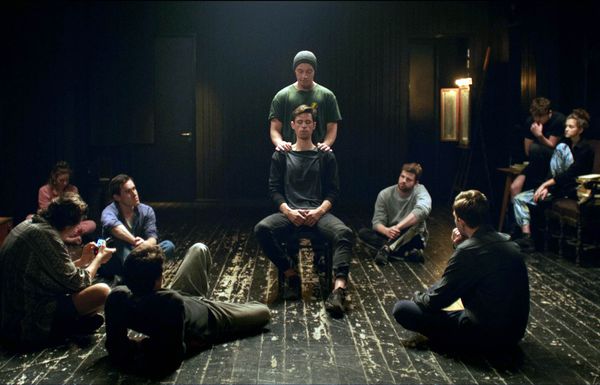Eye For Film >> Movies >> The Clowns (2023) Film Review
The Clowns
Reviewed by: Dalesia Cozorici

The Clowns stands as a successful debut in the career of Polish director Gabriela Muskała, who distinguished herself in the film Fugue (2018), both as a screenwriter and as an actress. There is a distinct blend of electrifying fiction and real-life events, and it's evident that her work in this instance is deeply tied to a sense of personal involvement. This is exemplified by her collaboration with students from the Łódź Film School, who attempt to subvert the traditional coming-of-age paradigm by employing a broad spectrum of of classical texts.
The group of drama students learns during their acting classes that the prodigy-director, Gajda (Oskar Hamerski), freshly returned from Cannes, intends to hold auditions for his upcoming project. The unusual nature of the film takes shape during the audition and selection process, as two pairs of actors are chosen to portray the roles of Cain and Abel, as well as Balladyna and Alina. Both stories, one biblical in the case of the two brothers, and one theatrical in the case of the two sisters, use sibling rivalry to the point where one commits a criminal act, opening the discussion about whether someone is born evil or becomes so. Members of each group start to immerse themselves in their roles, blurring the line between acting and reality to the point where they begin to harm themselves, following the writings that inspire their characters.

Subsequently, this delves into the topic of human nature and its malevolence. The characters trail the Buñuelian course of actions, with their fury depending on that of others, which in fact originates from the socio-political landscape; orchestrating everything into destruction. Also, the focus is on showing that through the characters' arguments, whether related to minor everyday complaints or friendship, the darker side of humanity often hides behind social conventions.
To portray these transitions and uncontrolled states, a visceral assault of colors and a sense of claustrophobia are required. On top, the narrative logic is divided into scenes where there's an impression that an individual perspective of the characters is followed, when they are intensely repeating their lines, imagining that they are engaging in dialogue with other people or filming their practice tapes. However, when Olo (Sebastian Dela) is fighting with his best friend Łukasz (Jan Łuć) the camera doesn't attempt to show a point of view, but it emulates his state of mind through chaotic movements.
Making a film about the coming of age of these young students is challenging, no matter how critical it is intended to be, as it often involves leaving behind clichés. These include depictions of parties where dancing partners are often mismatched, an excessive reliance on sentimental themes, portrayal of misunderstood parents, trivial sexual elements and discussions that come across as tiresome. Even through repetitive scenes, where each group of friends is destined to break apart, likely due to betrayals, these clichés persist, as their childish jealousies surface. The justification of their age and the reference pieces that intertwined somewhere at the beginning of the film gradually unravel towards the end. However, this doesn't mean that there is no emotion and intention from the characters; on the contrary, it complicates them.
In any case, The Clowns does justice to the pattern it emulates, because it creates a dual dimension - one of young people trying to survive and the other of a digital space with an exit to a constantly recording video camera.
Reviewed on: 14 Oct 2023


















